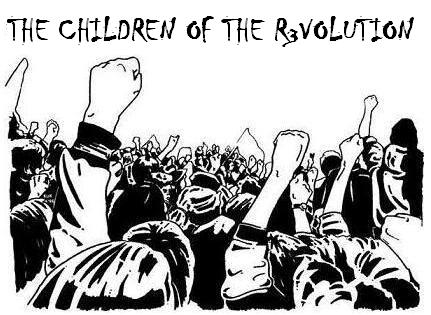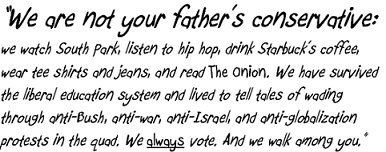
“Congress shall make no law respecting an establishment of religion, or prohibiting the free exercise thereof; or abridging the freedom of speech, or of the press; or the right of the people peaceably to assemble, and to petition the Government for a redress of grievances.”
Let me start by saying that it is my fervent hope that this particular article in the Teaching Conservatism series is entirely superfluous, that what follows is nothing new to the reader, that a clear and accurate understanding of the First Amendment to the United States Constitution can be assumed on the part of all citizens. It is my gnawing fear (borne from careful observation of my peers) that this is not the case, however, that spurs this article’s publication.
The First Amendment concerns what is commonly referred to as our freedom of expression, encompassing our free exercise of religion, speech, publication, peaceable assembly, and petition. As with all ten amendments that constitute the Bill of Rights, it is an explicit expression of the limitations of Government’s authority over the individual rather than a bestowing of rights upon the people.
Let us begin with free exercise of religion. It was the concern of many of the Founders, particularly Jefferson (who in fact had no involvement in the drafting of the United States Constitution, contrary to common belief), that the new American government might, by establishment of a state-sponsored religion or Church, not only coerce and persecute its own citizens but pervert religion itself for political purposes. The First Amendment was intended to unambiguously protect the right of the citizen to be secure from Government harassment or abuse due to his faith or lack of faith. Religious freedom is further protected in Article VI of the Constitution, which states that “no religious Test shall ever be required as a Qualification to any Office or public Trust under the United States.” In other words, Government cannot circumvent the First Amendment by packing the legislative, executive or judicial branch with religiously homogenous officials that would amount to de facto rather than de jure religious establishment.
While it is clear from the writings of the Founders that the Constitution was intended to establish a separation of Church and State, debate has nevertheless raged over the years as to what form that separation should take. Do religious displays on Government premises, for instance, represent sponsorship of that particular faith? Do the words “In God We Trust” emblazoned on our currency do the same? There are many who adamantly argue that they do. Conservatives, however, typically understand the Establishment Clause as the official establishment by act of Congress of a state-sponsored religion or Church. More to the point, we feel that any sponsorship of religion by Government that has a compulsory element by which you are forced to exercise a religion against your will represents a clear violation of the separation of Church and State. The words “In God We Trust” do not compel atheists by law to attend church or Muslims to refer to “Allah” by the Christian nomenclature of “God.” Religious displays or signs advocating atheism on Government property likewise do not represent religious establishment, so long as petitioners of all faiths are permitted to have displays should they so choose.
Regarding freedom of speech, over the centuries litigation and legal interpretation have settled with relative clarity most of the grey areas in the language of the amendment; as is always the case, your inalienable rights exist insofar as they do not infringe upon the rights of others. For instance, from the beginning this amendment was understood not to protect libel, slander, perjury, or copyright infringement. More recently, in the Supreme Court case Brandenburg v Ohio (1969), the concept of “imminent lawless action” was established, by which free speech is not protected if it is likely to cause a violation of the law faster than a law officer can reasonably be summoned to the scene. Other recently established limitations exist, such as the Miller test, which is used to censor “obscenity” according to community standards. Beyond this, your freedom of speech is boundless. You are free to openly criticize or praise government, society, individuals, and institutions. You are even free to lie, so long as those lies do not constitute libel, slander, perjury or incite “imminent lawless action.” Freedom of the press goes hand in hand with freedom of speech, in that citizens are at liberty to broadcast their free speech to as wide an audience as cares to listen, be it by print, internet, television, radio or otherwise.
Real conservatives embrace freedom of speech and the press, as it represents the most potent weapon against tyranny in our republic. The power to inform and be informed remains the determinative factor of who truly governs in any society. With this power, however, comes the power to dis-inform. While insidious, this power remains constitutionally protected (within the aforementioned limits), as the People and not Government must remain the final arbiters of what is true and what is not. As Jefferson, the father of our conservative movement said in his first inaugural address, “If there be any among us who would wish to dissolve this Union or to change its republican form, let them stand undisturbed as monuments of the safety with which error of opinion may be tolerated where reason is left free to combat it.” Consequently, the conservative answer to bias or untruth in the media is refutation through participation in public discourse rather than censorship of the offenders. Hence this blog.
Freedom of speech and the press fascinates me the most, primarily because even the Founders who drafted the First Amendment disagreed upon the extent to which this right was constitutionally protected. In 1798, in the thick of the Quasi War with France, President John Adams and the Federalists in Congress enacted the Alien and Sedition Acts to protect the federal government from “domestic enemies”. The Sedition Act made “false, scandalous, and malicious writing” against the government and its officials illegal. Numerous newspaper editors were jailed and fined for criticizing the president and his administration. Fortunately the Act expired in 1801, before it could be challenged in court (jurists have widely agreed that any such challenge would have carried the day).
Nevertheless, the debate over the enforcement of “truth and accountability” in the media astoundingly still rages just as it did then. The focus of modern ire is talk radio and internet blogging. The Fairness Doctrine, which was an FCC policy from 1949-1985, compelled radio broadcasters to present opposing viewpoints to their own on their programs. There is talk on the part of many Democrats (including former President Clinton) of reinstating this policy by act of Congress. While the Fairness Doctrine was upheld by the Supreme Court decision Red Lion Broadcasting Co v FCC (1969), conservatives typically feel that compelling speech on the part of private citizens or interests is just as unconstitutional as restraining or punishing speech. Especially with the diversity of modern media, opposing viewpoints are ever-present and freely articulated should citizens seek them. Moreover, placing the arbitration of what is true or not in the hands of Government rather than the People is anathema to the intent of United States Constitution.
Finally, freedom of peaceable assembly and petition are the second-most potent weapons (next to speech/press) in the arsenal of the citizenry. They permit American citizens to demonstrate by show of numbers the support for an idea or communicate ideas freely and directly to large groups of their fellow citizens. Freedom of petition similarly allows citizenry to demonstrate numerical support for a grievance to Government. Without the freedoms of peaceable assembly and petition, Government may dismiss any opposition movement as fringe discontents who constitute a minority, just as tin-pot dictators continue to do all over the world today. Furthermore, just as with the freedoms of speech and press, assembly and petition permit opposition to Government to organize rather than be fragmented, disparate and ultimately powerless.
Real conservatives celebrate the First Amendment, just as they celebrate the Constitution as a whole, without reservation. We are not fundamentalists clamoring for state-established religion. We do not advocate the muzzling of political opposition or dissent. Indeed, in recent years we have become the voice of opposition and dissent. We insist upon the freedom to organize, assemble and demonstrate our strength to our Government, just as we insist that these freedoms be accorded to our political opponents. Our movement is predicated on the free exchange of rational ideas.







No comments:
Post a Comment